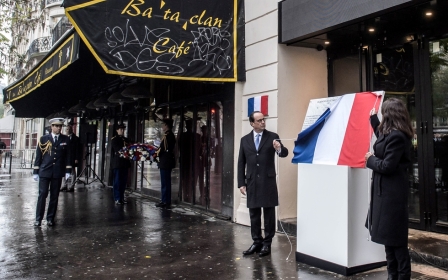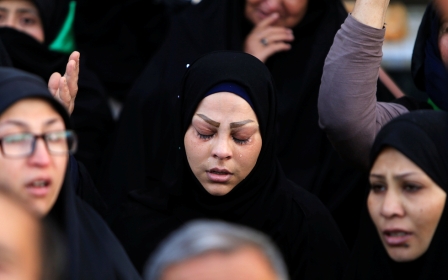Islamic State group claims Ohio university attack
The Somali student who wounded 11 people in a car-ramming and knife attack on an Ohio university campus was a "soldier" of the Islamic State (IS) group, a news agency linked to the militant organisation said on Tuesday.
The Amaq agency said the rampage on Monday by Abdul Razak Ali Artan, 20, a logistics student at Ohio State University, was the result of IS calls to action.
Artan was shot dead on Monday by police moments after he drove his car into a crowd of pedestrians on the campus in Columbus, and attacked them with a butcher knife.
"He carried out the operation in response to calls to target citizens of international coalition countries," the agency quoted an insider source as saying, according to a translation by the SITE group that monitors militants.
Police have given no motive for the attack on the Columbus, Ohio campus.
So far, investigators have found no strong evidence linking Artan to other known militant individuals, cells or groups, two federal law enforcement officials told Reuters.
Artan's actions fit the pattern of lone-wolf militants who carried out other attacks, such as the gunman who shot to death 49 people at a nightclub in Orlando, Florida, in June, and the man who killed four US Marines and a Navy sailor in a shooting in Chattanooga, Tennessee, last year, the officials said.
CNN also cited law enforcement officials as saying that the assailant was inspired by militant propaganda.
According to media reports, Artan shared posts on social media praising al-Qaeda leader Anwar al-Awlaki who encouraged militant attacks in the West.
Awlaki was killed in a US drone strike in Yemen in 2011.
'Media frenzy'
Ohio is home to the second largest Somali community in the United States, numbering around 38,000 in the Columbus area alone, according to the state's Somali community association.
Members of Columbus' Somali community have denounced the attack, stressing that the attacker only represents himself.
Asha Noor, a Michigan-based Somali American Muslim activist, told Middle East Eye the public will never get the full story because Artan was killed by the police.
She criticised law enforcement officials speaking to the media about terrorism links and self-radicalisation, saying they are creating a "media frenzy" without knowing exactly what happened.
Noor added that there were no allegations of a militant attack before the assailant's ethnicity and religion were reported.
“This shows that connection to terrorism is seen through a religious lens,” she said.
The activist warned against using the incident to expand government surveillance programmes that target Somali and Muslim communities, including Countering Violent Extremism, a federal initiative that she said entraps and threatens Muslims’ civil rights under the guise of cooperation with law enforcement.
The country's largest Somali community, in Minnesota, was rocked when one of its members stabbed 10 people at a mall in September. IS later claimed the attacker was a "soldier," the same claim as for Artan.
The attack
According to US media, Artan's family arrived in the United States from Somalia via Pakistan in 2014. He was studying at OSU as a third-year transfer student of logistics management.
In an interview a few months ago with student newspaper The Lantern, Artan had complained of the lack of Muslim prayer rooms on campus.
"If people look at me, a Muslim praying, I don't know what they're going to think, what's going to happen," he said.
US media reported that a Facebook page thought to belong to him - since taken offline - included grievances against the US.
"I can't take it any more. America! Stop interfering with other countries, especially the Muslim Ummah. We are not weak. We are not weak, remember that," an alleged post quoted by ABC television said, using a term referring to the global community of Muslims.
"If you want us Muslims to stop carrying [out] lone-wolf attacks, then make peace," the post reads. "We will not let you sleep unless you give peace to the Muslims."
Classes resumed Tuesday at the university, with all but three of the 11 injured discharged from hospital, according to Andrew Thomas, chief medical officer of Ohio State University's Wexner Medical Center.
"Everyone still continues to be healing, obviously, working through the trauma of yesterday's events," Thomas told a news conference.
One of the injured, who was discharged Tuesday, addressed the news conference. William Clark, an emeritus professor at the university, said he was struck by Artan's car and flipped in the air.
"It all happened so fast," Clark said, holding back tears when speaking of police officer Alan Horujko, who responded to the scene and quickly shot dead Artan, halting his attack.
Clark also said he wanted to withhold judgement of his attacker until the investigation reveals more about what drove him to commit the rampage.
"Yes, he was from Somalia, but he's an OSU student," Clark said. "And, having been a faculty member for 35 years, I am only too aware of the things that drive students sometimes to do things that they wouldn't ordinarily do."
New MEE newsletter: Jerusalem Dispatch
Sign up to get the latest insights and analysis on Israel-Palestine, alongside Turkey Unpacked and other MEE newsletters
Middle East Eye delivers independent and unrivalled coverage and analysis of the Middle East, North Africa and beyond. To learn more about republishing this content and the associated fees, please fill out this form. More about MEE can be found here.




